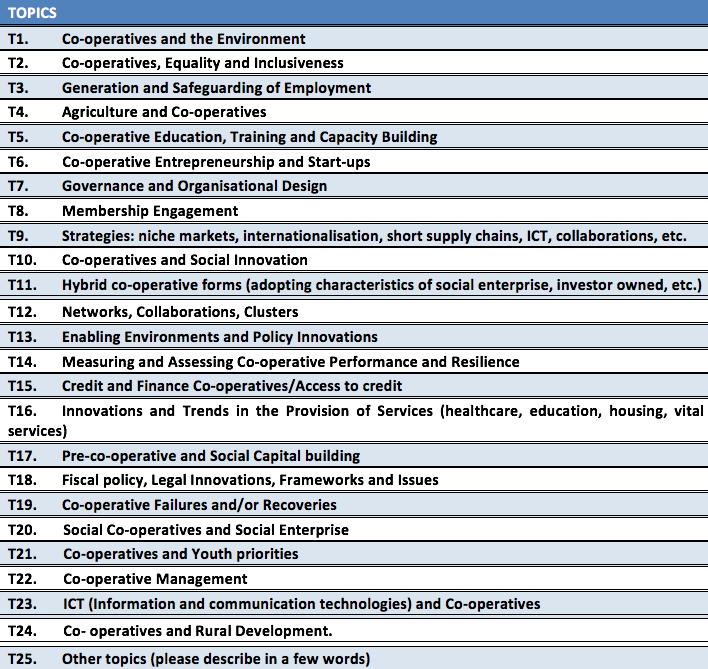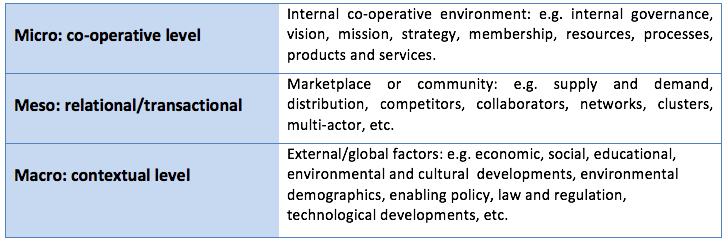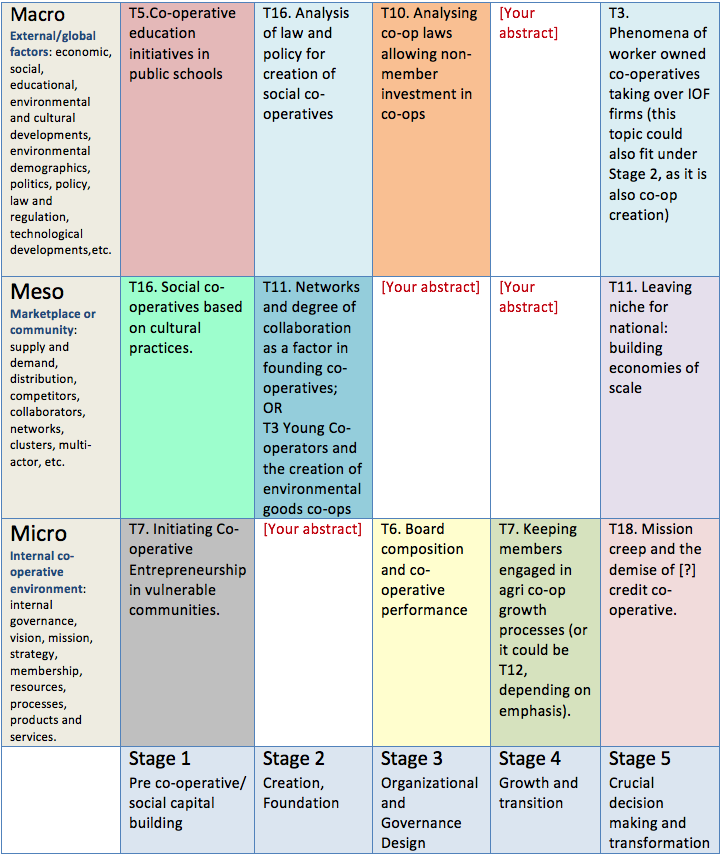BACKGROUND THEMES
See topics in Spanish at the end of this page.
Co-operatives are operating within tremendously volatile environments and must be agile, flexible and adept in meeting the needs of their members and communities. Co-operatives are exploring diverse strategies which may be related to management, organisational change, governance, collaborations, mergers and acquisitions, etc. A wide range of co-operative types and models in various stages of development and sophistication exist in both traditional and emerging fields. Definitions are blurring, based on the contexts in which co-operatives operate or have been created. A growing number of businesses are transitioning from investor owned enterprises to employee/worker owned co-operatives. Hybrid forms are springing up which are mixed with social enterprise or investor-oriented characteristics, as well as other community-oriented cultural practices.
At the same time, the co-operative organisational form (traditional or modified) is experiencing a renaissance or regeneration given the fact that other business models have not performed well in various areas such as: the generation and safeguarding of employment; the creation of sustainable and equitably distributed wealth; the protection of the environment; food security; the creation of enabling environments for innovation; ensuring gender equality; providing resilience against market shocks; protecting vulnerable people; fulfilling social necessities such as healthcare, education, housing and other vital services; and, in general, meeting the economic, social and environmental needs of a wide range of people across the globe.
The purpose of the conference is to explore and ensure an understanding of the various stages of co-operative creation, transition and transformation and to discuss the strategies co-operatives, co-operative institutions and policy makers may take to adequately manage such change and stages of development. In order to be successful, co-operatives must meet their objectives and benefit their members and communities, while at the same time taking into account specific contexts and the very different phases of co-operative development. For example, strategies of small, emerging co-operatives (often with a strong community base, diverse organisational forms and strong member commitment) may vary greatly from large, international business co-operatives (e.g. farmer-owned businesses). Co-operatives and related social enterprises occupy the whole range in-between these two examples, depending on scale, function, age, institutional, cultural and historical context, etc. As a consequence, the strategies and management of these varying types of co-operatives in the midst of volatility and diverse member and societal demands and challenges differ substantially.
TOPICS AND AREAS OF RESEARCH
Theoretical and applied research which takes into account such differences and the manner in which co-operatives themselves are created, transform and transition are welcome and will provide a useful and informative body of work which can be used by co-operatives from various scientific and sector areas in all stages of development.
With respect to the “pre co-operative” or social capital building stage or other business models which are synergistic or complementary, research could focus on other collective or community enterprise practices which precede, and/or foster co-operative development, as well as necessary enabling institutional support and legal and policy frameworks. Co-operatives may also form the base upon which to transition into other collective forms of entrepreneurship, as in the case of social enterprises.
Research presentations are welcome from all cooperative areas (worker, agriculture, services, credit, utilities, energy, consumer, social, etc.) as well as research pertaining to stages of co-operative development (creation, organisational design, growth and expansion, crises and change management), enabling institutional environments, education, etc. It is anticipated that transversal sessions on the various stages of development (as opposed to a focus on cooperative type) will provide a “wrap-up” function during the sessions.
PROPOSALS FOR SESSIONS ARE WELCOME AND ENCOURAGED.
If you propose a session, please suggest at least 4 related papers on the topic and submit abstracts for such papers.
YOUNG SCHOLARS
Young Scholar´s seminars and events will also be an important part of the agenda and suggestions from PhD and Post-Doc researchers are very welcome.
WE WILL ORGANISE THE PARALLEL SESSIONS AROUND TWO “LOGICS”: i) General topics which include a wide range of research areas: e.g. research on sectors or types of co-operatives, education, governance, environmental issues, strategies, etc. (please see the full list below) and ii) transversal approach which placed issues within a framework of cooperative development stages and levels of analysis.
*While at first glance, organising the content in this manner appears somewhat complicated for an Abstract submission, we appreciate your efforts so that we can organise the conference content in a more meaningful and structured framework. Please see our examples below where we guide you through the process in 3 easy steps.
i) General topics which include a wide range of research: e.g. sectors or types of co-operatives, education, governance, environmental issues, strategies, etc.:

ii) Transversal approach to topics and issues within a framework of co-operative development stages and levels of analysis:
- Stage 1 Pre-co-operative or social capital building/enabling environment conditions;
- Stage 2 Initiating, creating and founding the co-operative;
- Stage 3 Organisational and governance design;
- Stage 4 Growth and transition;
- Stage 5 Crucial decision-making moments or crisis and transformation.
For example, some questions which are related to stages of co-operative development may include: How are the conditions for co-operatives created in the absence of social capital? How can societies transition from cultural practices which may exhibit some solidarity to creating the environment for co-operative creation? What challenges are faced in founding co-operatives? What kind of co-operative law is necessary? How should co-operatives organise themselves internally? Is one-member/one vote always necessary? What governance mechanisms are important? Should co-operatives pursue growth? How does growth transform co-operatives? How is internal governance affected during these transformations? Are changes in relation to property and decision-making rights necessary? What happens to member commitment? What is the role of co-operative education in managing transition and transformation? What enabling environments and policy are necessary to navigate transition and transformations? Do co-operatives “outgrow” themselves? Why are hybrid co-operative/investor oriented entities born?
This list of questions is only a start—please feel free to pose your own questions.
Implicit in the transversal approach will be the contrasts found between small, emerging co-operatives (often with a strong community base and with strong member commitment, etc.) and the large, international business cooperatives (which are mainly farmer-owned businesses). A whole range of diverse co-operatives exist in-between these two poles, depending on scale, functions, age, institutional context, etc. Questions to consider are how the challenges, concerns, visions, objectives, strategies and management of these different ‘types’ of cooperatives differ substantially (or what they may still have in common).
We also have a very special interest in co-operative “failures”. Why do co-operatives “fail”? How do they resolve or react to their failures? This topic may be considered to fall under Stage 5 “decision-making moments and transformation” but may also be relevant in other co-operative development stages.
To place your research in context, the co-operative development stages framework include 3 levels in which co-operative research may take place: the “micro” or “firm” level of co-operatives and their internal environment; the “meso” level which is the marketplace or community in which the co-operative operates; and the “macro” level, which is the social, cultural, economic, policy, etc. environment.
Levels of Analysis

When submitting your abstract, FIRST, please choose one Topic on the list which best corresponds to the content of your abstract. SECOND, consider in which co-operative development stage (Stages 1 to 5) your work best fits. THIRD, choose the level of analysis (micro, meso, macro) which your work addresses.
FOR EXAMPLE; WHERE IS YOUR RESEARCH/ABSTRACT LOCATED ON OUR “STAGES OF CO-OPERATIVE DEVELOPMENT CREATION, TRANSITION AND TRANSFORMATION” TABLE?
See a few of our generic examples (these are just sample topics to illustrate the approach):

This approach is meant to provide a framework for organising sessions and research. It is not intended to be a rigid structure. Please feel free to adapt it to your research work.
